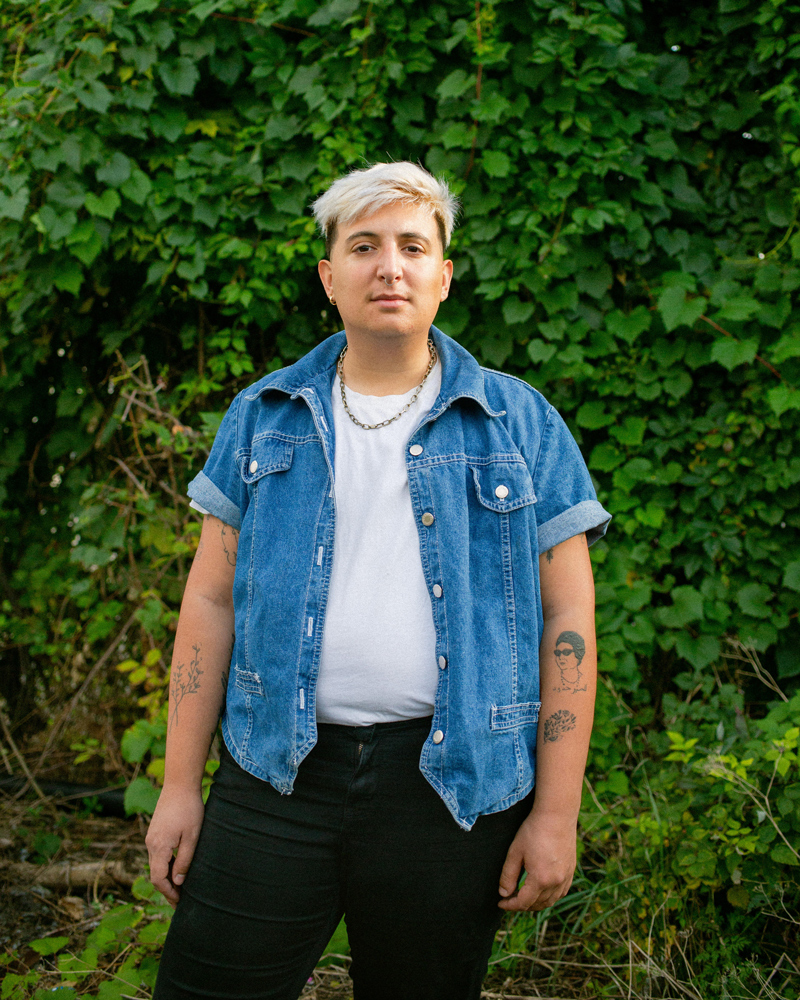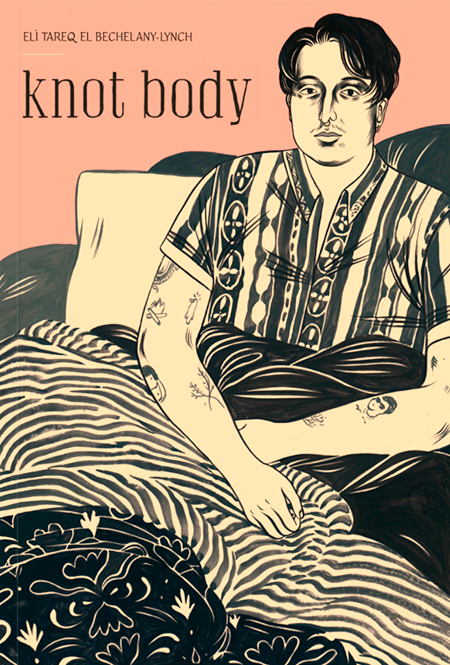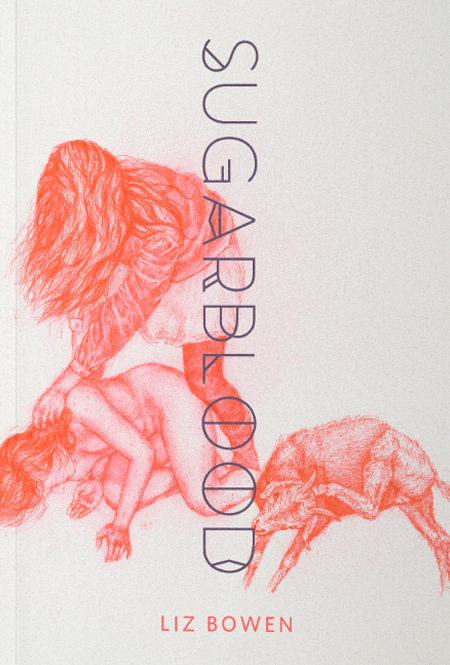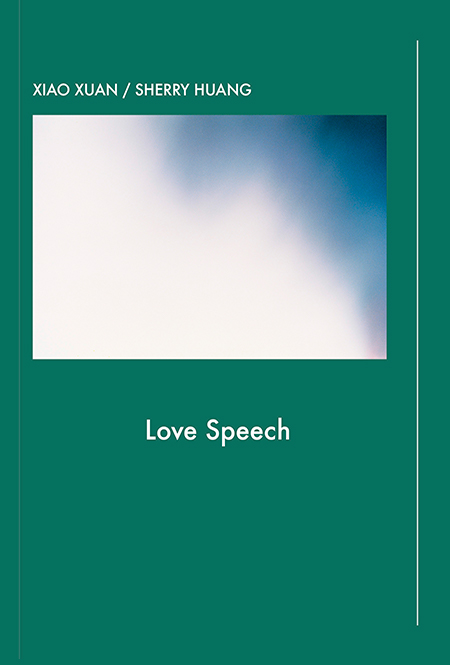knot body
Eli Tareq El Bechelany-LynchI anticipate showing up today, fresh and clean, the energy of yesterday and tomorrow running through my pores, and yet—dismissed before the first step out of bed, so who knows how this will go.
Bringing together poetry, essay, and letters to “lovers, friends and in-betweens,” Eli Tareq El Bechelany-Lynch confronts the ways capitalism, fatphobia, ableism, transness, and racializations affect people with chronic pain, illness, and disability. knot body explores what it means to discover the limits of your body, and contends with what those limitations bring up in the world we live in.
knot body was shortlisted for the QWF First Book Prize. Their second collection of poetry, The Good Arabs (Metonymy Press), won the 2022 Grand Prix du Livre de Montréal.
Praise
“For me, the power of knot body stems from its courage and unique voice in writing the ache, the ache of chronic pain, the ache of faulty diagnoses and bodily misreadings, and, equally, the ache for honest answers on how to love each other in all our dignity. Eli Tareq El Bechelany-Lynch is an artist and philosopher of talent, generosity, and heart.”
– David Chariandy, author of Brother (Penguin Random House)
“In this moment, when trans, racialized and disabled bodies are met with violent and polarizing commentary within the public sphere, Eli Tareq El Bechelany-Lynch offers us the uninterrupted intimacy of knot body. As self-communional as Kiese Laymon’s Heavy and Terese Marie Mailhot’s Heart Berries, they amplify and queer the epistolary memoir genre. Each letter is emotionally and thematically complete and, too, each letter decidedly speaks to the next. Readers may ruminate on the sharp and sensual inquiry offered by each individual letter, or read cover-to-cover and be present to the gorgeously-engaged, call-and-response quality of knot body as a whole.”
– Amber Dawn, author of My Art is Killing Me (Arsenal Pulp Press)
“knot body is such a generous tapestry of tenderness—a collection that brilliantly utilizes the direct address in a way that is not universal, but still beautifully communal. I reached the end of this collection and breathed in a newer, better world.”
– Hanif Abdurraqib, author of A Fortune for Your Disaster (Tin House)
Reviews
Writer’s Trust – “knot body is an experimental book that plays with the ways pain can be expressed on the page by combining letters, poems, and a lyrical essay. The speaker is a queer and trans Arab writer with fibromyalgia who explores their diagnosis and wonders what it means to have a disorder that’s both rarely understood by the medical system and presumed to be only experienced by cis white women.”
This Magazine – “El Bechelany-Lynch’s writing is at once an intimate inventory and a daring confession of what it means to listen to one’s body—all the ways that capitalism and ableism marginalize and dismiss queerness, chronic pain, invisible disability, and race.”
The Puritan – “El Bechelany-Lynch powerfully illustrates the chaos of life in a body. In a time of political reckoning and rageful questioning of the-way-things-have-always-been-done, this book makes so much sense. We are invited—encouraged—to critique the effects of capitalism, racism, ableism, and fatphobia on marginalized bodies, to viscerally feel the pain caused by the trauma of having a physical form in a world that stops at nothing to break it. Most importantly, we are welcomed both hard and gently to think again, to question, and as bell hooks would say, to choose ‘the margins as a space of radical openness.'”
Arc Poetry – “A collection of many forms ranging from epistolary to essay—a knotted body of text talking in the language of pain—queer and trans mixed Arab poet Eli Tareq El Bechelany-Lynch’s debut poetry collection knot body is a playful, curious, and incisive call to return to the body that explores, among other things, the invisible and (trans)gendered aspects of chronic pain.”
Room Magazine – “Defying ableist narratives of illness that demand triumph, El Bechelany-Lynch is more interested in the intimate textures that living in and writing from a disabled body make possible.”
Canthius – “In knot body, El Bechelany-Lynch hits the ground with a running start, using the language of pain to form a bond between speaker and the “you” who reads the words, whoever that “you” may be. The reader is not only made aware of the speaker’s knot of pain, but experiences it as it circulates through the body. This text is unflinchingly real, and never strays from the powerful choice to be unquestionably open, and brimming with love.”
Maisonneuve Magazine – “In knot body, El Bechelany-Lynch describes the ancestral pain they inherited from their Teta (grandmother), the physical pain they live with each day, and how they care for themselves through both.”
The Temz Review – “knot body not only expresses in its form the unconventionality of its narrative, but also suggests that no one genre can encapsulate the experience recorded in its pages. El Bechelany-Lynch’s blend of epistolary memoir and poetic musing is not a one-size-fits-all account. This lyrical fusion of love letter, personal essay, and experimental poetry succeeds in capturing El Bechelany-Lynch’s particular intersectional experience in a way that more traditional literary forms could not.”
The Malahat Review – “El Bechelany-Lynch wrestles with the interrelationship of trauma, chronic pain, queerness, colonialism, and gendered violence with humour and generosity… The work cracks open form and queers it; each letter is part of an imagined correspondence but stands alone, and many pieces transform over page breaks from lyrical to confessional and from poetry to essay.”
The Capilano Review – “knot body joins a growing canon of writing about illness and disability through an explicitly queer lens that includes work by Eli Clare and Leah Lakshmi Piepzna-Samarasinha, both of whom are referenced throughout the book. By adding their perspective to this multiplicity of voices, El Bechelany-Lynch acknowledges the power of a collective to reframe the way we talk about our bodies. ‘we are not the cure,’ they write, ‘or the shapes we take to survive. we move in packs, visually diverse yet connected at our cores, pieces of truth emerging in group, through laughter, through our own songs intermeshed, through our battle cries, creating the loveliest blend of sound.'”
Quill & Quire – “Personal letters comprise much of the book. El Bechelany-Lynch implicates the reader in their narrator’s illness, framing the state of being sick not just as something that a person experiences but also something that is performed, witnessed, and invented in the space between people. In this way, knot body positions illness in the context of relationality.”
49th Shelf – “Readers may sit and ruminate on the sharp and sensual inquiry offered by each individual letter, or read cover-to-cover and be present to the gorgeously-engaged, call-and-response quality of knot body as a whole.”
rob mclennan – “…the poems of knot body examine the possibilities of a body that exists with constant pain, attempting to negotiate the daily elements of living in a world and culture that perpetually denies their existence.”
Lists
CBC Books – 12 Canadian books to read for Disability Pride Month
Librairie Drawn & Quarterly – Staff Picks 2020 – Rachel
“In a series of poems, letters, and an essay, knot body takes us through the extremes and normalcy of living with chronic pain, and, importantly, the intersections of gendered illness with queer life. The poetics here are precise, yet call readers continually into reflection and responsibility.”
Librairie Drawn & Quarterly – Staff Picks 2020 – Alyssa
“(A) collection full of poems that bring such lyricism to chronic pain, and letters perfect in their unstudied intimacy.”
Librairie Drawn & Quarterly – Staff Picks 2020 – Saelen
“knot body is a collection of poems, essays, and letters that confronts how embodiment is conditioned by capitalism, fatphobia, transness, ableism, and racialization. It’s tender, creaturely, and companionable.”
CBC Books – Fall Books Preview – Canadian poetry collections to watch for in fall 2020
“knot body is a poetry collection by queer mixed-race Arab poet Eli Tareq Bechelany-Lynch that confronts racism, capitalism, ableism, transphobia and fatphobia. It’s about the limits we have in and on our bodies and how those limits define how we connect with the world — and how we can break these limits down to remake a more inclusive world.”
Autostraddle – 65 Queer and Feminist Books Coming Your Way In Fall 2020
Interviews
THIS Magazine – Writing Through Pain – An Interview with Eli Tareq El Bechelany-Lynch
“El Bechelany-Lynch’s writing is at once an intimate inventory and a daring confession of what it means to listen to one’s body—all the ways that capitalism and ableism marginalize and dismiss queerness, chronic pain, invisible disability, and race.”





